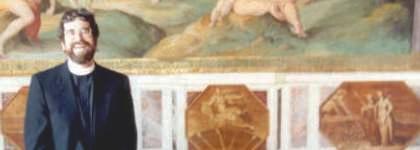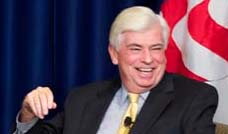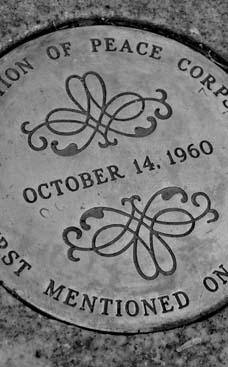
When I was in Africa, in some of the poor areas, you would set up your telescope and kids and grown-ups would have the same thrill I used to have as a kid in looking at the moon through my telescope. That thrill came back to me. It reminded me why we do this. It's not to get bigger and better grants, not to show up your colleague, but because this stuff is beautiful and true.
As Stephen Hawking denies the existence of God, Kenya RPCV Guy Consolmagno says he can see Him every time he looks through his telescope
God's Astronomer
13/09/2010
As Stephen Hawking denies the existence of God, the Vatican's chief stargazer says he can see Him every time he looks through his telescope
By Vicky Davidson
Brother Guy Consolmagno worked as a scientist in California for 15 years before deciding he wanted to be a priest. He trained and was ordained as a Jesuit before joining the Vatican Observatory as an astrobiologist and studying the depths of space. Rather than trying to convert scientists to God, he sees himself as a missionary converting religious people to science.
With Stephen Hawking last week reversing his position and saying he no longer believed God created the universe, Brother Guy argues that there is no conflict between science and faith, and reveals how he finds his Creator in the stars. He has little time for Creationists, though.
Your visit to the UK is the week before the Pope arrives are you being sent to soften up the ground?
There was no planning there at all!
We're used to shows like X Factor, are you concerned people might not behave solemnly when the Pope arrives in the UK?
Human beings are going to be human beings. As someone pointed out, the opposite of love is not hate, it's indifference. If the Pope came and nobody cared that would be worse. I remember in Boston, which is very Catholic, 30 years ago when the Pope came to visit some people were complaining, why were they doing all this for the head of a religion; we did the same thing when the Queen came, and she's head of a religion.
As the Vatican's astronomer, and curator of its meteorite collection, what's the best bit of your job?
I enjoy holding these pieces from outer space. The science is to measure their physical proportions, their dimensions, porosity, the way they conduct heat, their electromagnetic field that tells you something about how they are put together, about the physical conditions were like in the solar system 4.5 billion years ago, when these guys were made. Just holding them makes you feel very humble. You realise the concerns of the day to day, what's for lunch', look very small compared to the scale of the universe you've got sitting in your hand.
What's the coolest thing you have in your meteorite collection?
It's like asking what's your favourite child. We've a couple of pieces that came from Mars, that's what we show off. Everyone's thrilled to be holding a piece of Mars. And we have a fragment of a meteorite from Allende, in Mexico, which fell in 1969. It has small white bits we think have bits of stardust that date from before the formation of the solar system. How could you beat that!
Do you think there is a conflict between religion and science?
No. I don't. You have to understand where this idea came from. It's a modern idea, and I mean modern in the last 10 or 15 years. When I was a child it was the nuns in Catholic school who taught me science, nobody had a problem about this. It's a mythology that came up in the '70s, in the culture wars [when sections of the American religious right attacked certain aspects of science, medicine and arts as blasphemous, inciting a backlash], with people who didn't understand science and people who didn't understand religion.
If you dedicate your life to studying rocks, if you think that nature is wonderful, if you think that nature is worth immersing your life in, getting to know better, spending your life studying, that ultimately is a religious belief. It's not going to make me rich, put more food in my stomach, make me more popular with girls. You do it because you love creation, and that ultimately also has a religious basis. Too often science is presented as either/or.
The people who are extreme in their positions either way creationists or extreme science are acting out of fear. In some ways I feel sympathy for them but I wish they had more faith in their faith, more love of truth.
Does creationism give all religions a bad name?
It's like McDonald's, like fast food. It's a cheap and easy answer but ultimately not very nourishing. It's a simple answer. Museums of creationist science we can laugh about it but on the other hand, why would they bother even trying to make a creation-science museum if they didn't recognise that science is an important thing? What they really want is a science that doesn't threaten their religion or others important to them. I can be sympathetic to that.
As funding for science has been cut across the globe, how have things been within the scientific community in the Vatican?
They have been supportive in the last couple of years with the economic downturn. They have built another new centre for us in the Papal garden. We've got a brand new lab the Pope came personally to bless it and our work.
What's the attitude within the Vatican to the scientists' work?
I think they recognise that we need to know what's going on in the world. Since there is a Pontifical Academy of Sciences [founded more than 400 years ago], there's more than 100 scientists of all faiths and backgrounds. As part of the world we have to know what's going on. It is a way of knowing the universe and a way of being engaged with the 21st century, with culture, where people are now.
Would the Vatican ever suppress scientific findings it didn't like?
It's never happened. Quite frankly, most of the time they've no idea what we're doing. But that's true of most funding agencies, after a while they say it sounds good'. I can't imagine a situation where it would come up, partly because astronomy is so esoteric to begin with. Even when the Church takes on issues of science, it's never whether they're true or false, it's a matter of is this a good idea?'
Have you ever had to struggle with your faith in the face of any of your scientific work?
No. The only time I have had a struggle of faith was my faith in fellow scientists when I was young I thought we were all in it to find the truth. I discovered many people I was working with were in it for themselves, then I realised I was becoming one of those people. That was a struggle of faith for a while, and I left science.
Then you went to work for the Peace Corps?
Exactly. That reaffirmed my faith in science. When I was in Africa, in some of the poor areas, you would set up your telescope and kids and grown-ups would have the same thrill I used to have as a kid in looking at the moon through my telescope. That thrill came back to me. It reminded me why we do this. It's not to get bigger and better grants, not to show up your colleague, but because this stuff is beautiful and true.
Why are humans fascinated by the stars?
I ultimately don't know why but to deny it would be to deny the existence of love. Since I was a small child they were beautiful, it was a place that my father showed me the stars. It was a way we could connect and still do to this day. He had been a navigator on bombers during the war, stationed in Great Britain, and that's where he learned navigation using the stars. Even before then he had been fascinated by the stars. I hope that I can pass that on to people.
What impact did the moon landings have on you?
I started school the year Sputnik went up and we started the space age. The moon landings occurred when I was at college. I got to know some of the people who were involved in the programmes. I met some of the astronauts. I worked on the rocks they brought back.
You sound like a missionary for science.
Being from the Vatican, my goal is to encourage religious people not to turn their back on science. I'm not here to convert scientists to be religious but I'm here to remind the religious people that science is a way of getting in touch with that joy in our heart. It's important that science is presented as something that is open to every religion.
Was there another field of science that tempted you?
I was interested in everything and astronomy has a bit of everything. In the early '80s I had a chance in Cambridge, Massachusetts, when all these software companies were coming up, to work for one of the first companies that made the first spreadsheet programmes that company went bankrupt. Even then it was a decision am I in it for the money or for the benefit of people? It wasn't the life I wanted.
Which is the best telescope or observatory in the world?
The best I have used was the 10m telescope in Hawaii. There are some spectacular new telescopes going up in Chile, very dark and far from city lights. You have to go a good distance now to get away from cities. Probably most people in Britain have never seen the Milky Way. We are losing part of our heritage, for the sake of lights. We could light up a lot more intelligently.
Have you ever seen God when you've pointed your telescope into space?
It's like asking have you ever seen love. There are moments when you experience love; yes there are moments in my science when a set of data come together, I have insight, all the pieces of the puzzle fitting together beautifully; along with that is a sense of joy, that rush of God, like that sense of joy you get at a moment of truly wonderful prayer. In that sense, I've been able to experience joy I've been able to experience God.
Who's your favourite Pope? Who did most for science?
Leo XIII [pope from 1878-1903] was a golden period for us. He founded the Vatican Observatory, he wrote the Papal Encyclicals on social justice that have been the cornerstone supporting the union movement since the 19th century. Also, around the year 1000, Pope Sylvester II was an astronomer who introduced Arabic numerals and the astrolabe to the western world and all the wonderful things from Arabic science. He was such a brilliant man. His enemies accused him of being a magician.
Who has done more damage to the Catholic church: Dan Brown or Richard Dawkins?
[Laughs heartily] Comparisons are odious. That's my answer!













